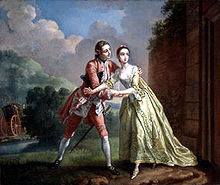MR. BELFORD, TO ROBERT LOVELACE, ESQ. FRIDAY, SEPT. 22.
…
The undeserved sufferings of Miss Clarissa Harlowe, her exalted merit, her exemplary preparation, and her happy end, will be standing subjects with us [i.e., Belford and Mrs. Lovick].
She shall read to me, when I have no company; write for me, out of books, passages she shall recommend. Her years (turned of fifty,) and her good character, will secure me from scandal; and I have great pleasure in reflecting that I shall be better myself for making her happy.
Then, whenever I am in danger, I will read some of the admirable lady’s papers: whenever I would abhor my former ways, I will read some of thine, and copies of my own.
The consequence of all this will be, that I shall be the delight of my own relations of both sexes, who were wont to look upon me as a lost man. I shall have good order in my own family, because I shall give a good example myself. I shall be visited and respected, not perhaps by Lovelace, by Mowbray, and by Tourville, because they cannot see me upon the old terms, and will not, perhaps, see me upon the new, but by the best and worthiest gentlemen, clergy as well as laity, all around me. I shall look upon my past follies with contempt: upon my old companions with pity. Oaths and curses shall be for ever banished my mouth: in their place shall succeed conversation becoming a rational being, and a gentleman. And instead of acts of offence, subjecting me perpetually to acts of defence, will I endeavour to atone for my past evils, by doing all the good in my power, and by becoming an universal benefactor to the extent of that power.
Now tell me, Lovelace, upon this faint sketch of what I hope to do, and to be, if this be not a scheme infinitely preferable to the wild, the pernicious, the dangerous ones, both to body and soul, which we have pursued?
I wish I could make my sketch as amiable to you as it appears to me. I wish it with all my soul: for I always loved you. It has been my misfortune that I did: for this led me into infinite riots and follies, of which, otherwise, I verily think I should not have been guilty.
